
Assassin's Creed Valhalla Review
The last Assassin's Creed title I played was Assassin's Creed Revelation in 2011. For the most part, I quite enjoyed the Ezio trilogy, even if its final entry was weaker than the two that came before it. At that point, however, I simply 'had my fill' of the franchise and wasn't especially interested in continuing with it despite my enjoyment. I figured I'd just take a break, play it by ear, and see when I would be in the mood to come back. Turns out that break lasted about a decade.
Even when Assassin's Creed shifted to more and more RPG-styled components with Origins, I still wasn't especially eager to return to the franchise. It was obvious that the games were absolutely huge timesinks, and with so many other games to play, I couldn't justify the time commitment and simply never got around to it. But with Assassin's Creed Valhalla, I finally got the itch of curiosity to see, first-hand, what this series had transformed into in 2020. Knowing it was a long, long game, I decided to go it slow and take my time with it. That also why this review is being published months after the release date, to note.
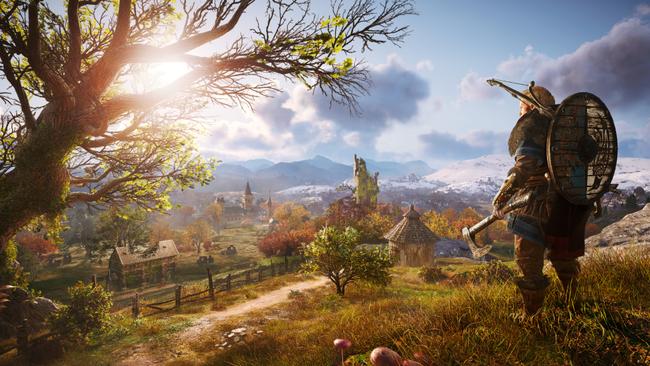
After the game's opening sequences, which see Eivor's parents killed by a rival viking clan, you follow Eivor's brother to England in other to establish a new settlement. Broadly, once you get to England, the premise of Assassin's Creed Valhalla is to create political alliances with the various regions of the country. The world map is separated into more than a dozen sections, and you can head to each one to - in one way or another - earn a pledge of support from the regional seat of power. One has you place a legitimate but shunned boy-king into his rightful throne, another has you prevent an ongoing usurpation attempt, a third has you solving a romantic quarrel, and so on. Not all of these regions have to be completed to reach the end credits, but this is the meat of the game right here.
This means much of the narrative beats of Valhalla are smaller, separated storylines rather than a singular continuous plot - though your brother Sigurd's ambitions do lead the game to its ultimate conflict and conclusion. As an aside, I do find it kind of strange that one of the initial story thrusts - gaining revenge against your parent's murderers - is pushed somewhat off to the side and can be resolved early into the game, leaving most of the rest of the runtime with this focus on political allegiance.
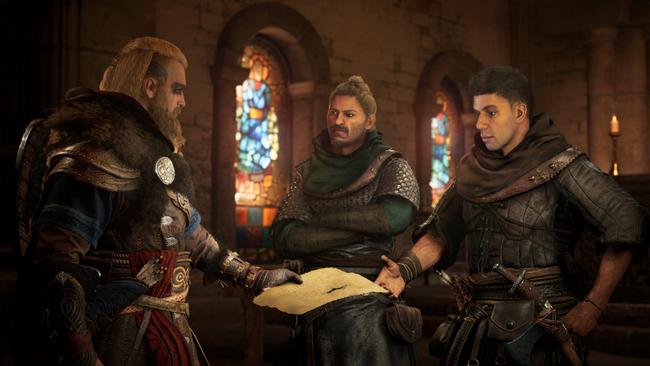
In general, I don't mind a more separated vignette-style narrative presentation, but one problem with Valhalla's regional setup is that the general flow of each region's story roughly falls into a similar routine. Not to say each region's throughline is completely identical to the next, of course, but certain beats are reused commonly. You are introduced to some conflict regarding a seat of power in each region, usually have to investigate in some manner, often followed by an assault on a settlement or fortress. It makes each storyline feel less unique and less likely to stand out, as you generally complete similar tasks for any one of them.
This sort of self-borrowing also finds itself in the open-world structure of the game. In some ways, it feels like Assassin's Creed hasn't changed much at all since the AC2 trilogy. The game map is still absolutely loaded with icons: treasures, mysteries, collectibles, and more. There are lots of checklists to complete and bars to fill if you so choose as you scour the game's gigantic world map.
'Mysteries' are a new experience for me, being effectively mini-quests or puzzles that Eivor can encounter on the map. There are probably more than 100 of these, and it's hard to remember any that leave a lasting impression. Maybe I'm cynical, or perhaps this is as simple as 'Ubisoft games are not for me', but the repetitive, checklist-style collect-them-all nature of these events felt solely like work moreso than being interesting at all. This goes for many of the other collectibles too.
It makes sense there would be some similar content here and there in order to fill such a large map, but it still feels a little too transparent that things too easily get a bit formulaic. I can't help but think less would be more here, in several regards.
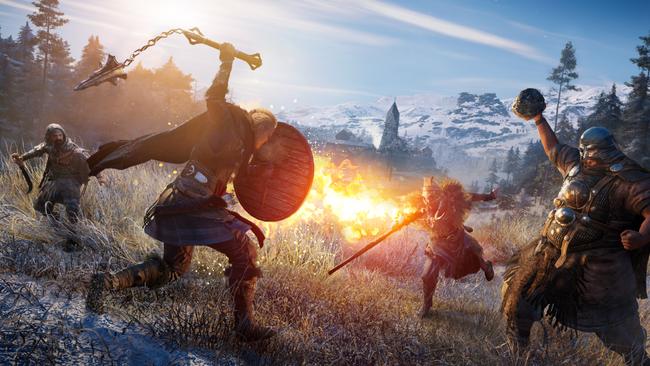
The one singular component to Assassin's Creed Valhalla I really could not gel with much at all was its direct combat gameplay. This clearly has been overhauled since the wait-and-counter days of the past, but I found it to be tedious regardless. You have a heavy attack and a light attack, plus you can perform guards and counters with proper timing. It's fine and functional, but not especially outstanding in any way. Primarily, there's just *so much* combat in Assassin's Creed Valhalla. Any outpost will have at least ten guys running down your neck as soon as you are spotted, and larger raids will easily have 20 or more wimps heading your way. I figure the high number of enemies was supposed to be balanced out by having your own team of vikings on your side, at least in some cases, but I still felt like I had to carry the load and deal with most enemies myself. Fighting got old quickly and never let up.
The raids themselves feel kind of aimless, too. It often boils down to wandering around a location, bashing through far-too-many enemy mooks, and locating the treasure chests with "loot". Raid one monastery and the rest essentially work in the same way. For the larger raids on the game's fortresses, you often have to complete certain objectives like breaking a barricade or bringing down a drawbridge. In these situations, there's little reason not to just beeline for these partial objectives to end the raid as soon as possible.
Boss battles in Valhalla are where Valhalla's combat components shine brightest. It helps that you aren't just mowing down mook after mook, but instead you need to judge dangerous combat animations and timings on a singular foe to deal the most damage while avoiding getting hurt yourself. I went a full melee build, and sometimes counters were the most effective, but other times I found it best to simply get as many hits in as I could after dodging.
One element that is new to Valhalla is that of building your own viking settlement. This is primarily the reason you want to do raids in the first place: to get materials needed to upgrade your facilities and grow your base of operations. You can make buildings such as a fishing hut, blacksmith, seer's hut, shipyard, and so on.
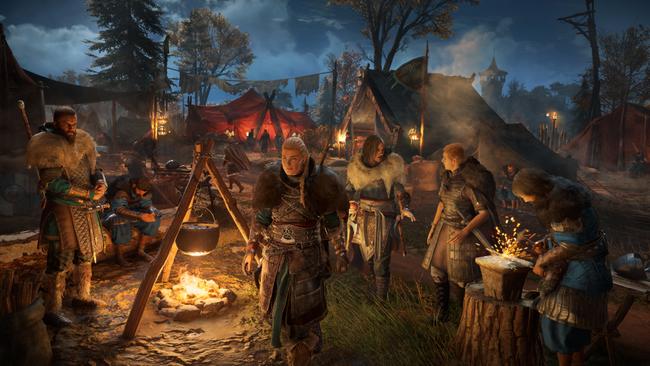
Sadly though, I found most of the settlement facilities to be nothing more than nice decorations rather than anything actually complementary to the game. The blacksmith is clearly the most valuable, allowing you to upgrade and create better equipment and armor. The Hidden One's bureau lets you track the various targets in the game, which ultimately leads to some optional stories and scenes. The Seer's Hut also opens up the mythological realms with more loot and story. The rest of the settlement facilities are largely cosmetic, letting you change Eivor's look, your ship, horse, or settlement itself. The Cartographer is nice for those wanting to clear the map of all the collectible icons. There are also food buffs, which I never used because I felt like I never needed to.
As a fan of RPGs (obviously), I was also a little disappointed in the new 'RPG' components of Valhalla. You have many dialogue options to make over the course of the game, but most of them have no real purpose whatsoever except to appear as if you have a choice in the matter. Oftentimes, Eivor will have to state each dialogue option in sequence anyway. Admittedly there are a few choices regarding Sigurd that do affect portions the ending, but the vast majority otherwise have no reason to be there.
The game's skill tree is also a bit uninspired. Most of it consists of small stat-ups to things like attack power or health. There are a handful of skills that can be unlocked through this tree, too, but several of these are passive boosts, and most of the rest of them feel as if their use case is too narrow to be actually interesting to use in combat regularly. Dodging and heavy attacks were adequate enough to take out most enemies. I did like the Stomp ability.
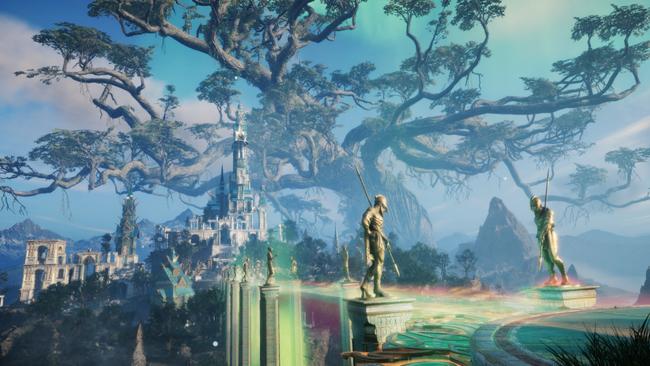
Playing on PC, Assassin's Creed Valhalla looks absolutely stellar. It's honestly one of the best components of the game. At 4K resolutions with HDR, the environments are crisp and the colors are vibrant. Even less beautiful components like brown rocks & mud look somehow striking. Even when I had to just simply travel for a few minutes from one settlement to the next, the virtual sightseeing was a nice delight. The game is quite CPU intensive though, and it became apparent that my Intel i7-7700K is showing its age. Especially in cities with numerous NPCs, sometimes my performance would struggle more severely compared to out in the rest of England. The patches the game has had since launch have already helped to improve the game's CPU utilization, for I applaud Ubisoft for continuing to optimize.
I one hundred percent expected to be completely lost when it comes to the Animus-based connecting storyline in Valhalla, knowing it was pretty 'out there' already in the Ezio trilogy, and I've missed seven mainline titles since then. Without the proper context, everything felt silly and nonsensical to me of course. I'm not sure if it makes any more sense within the proper context either. I guess I give Ubisoft some props for sticking with this silly plotline for as long as they have. Some of the in-game cinematography and voice-acting is genuinely impressive otherwise, at least for the main story scenes, so it's too bad it results in gibberish by the end.
Assassin's Creed Valhalla is a great-looking open-world game with impressive landscapes and cinematography. However, the checklist collectible open-world still needs some work to feel truly engaging, and combat is too tedious and too frequent to be compelling. As a lapsed fan of Assassin's Creed trying to see if I can click with the series once again, Valhalla didn't quite hook me as I was hoping it would.